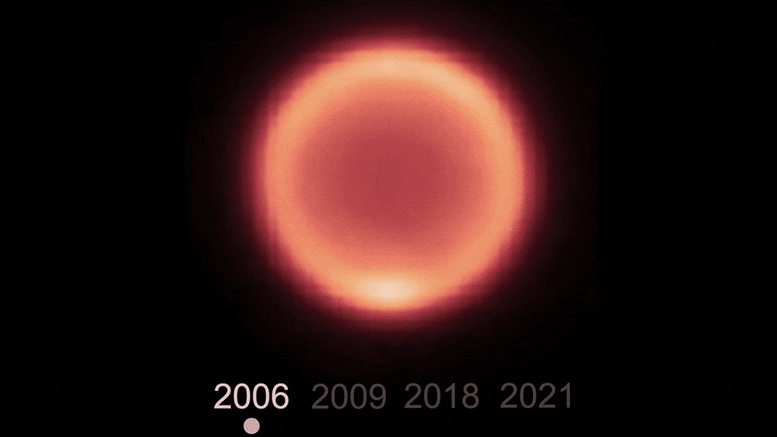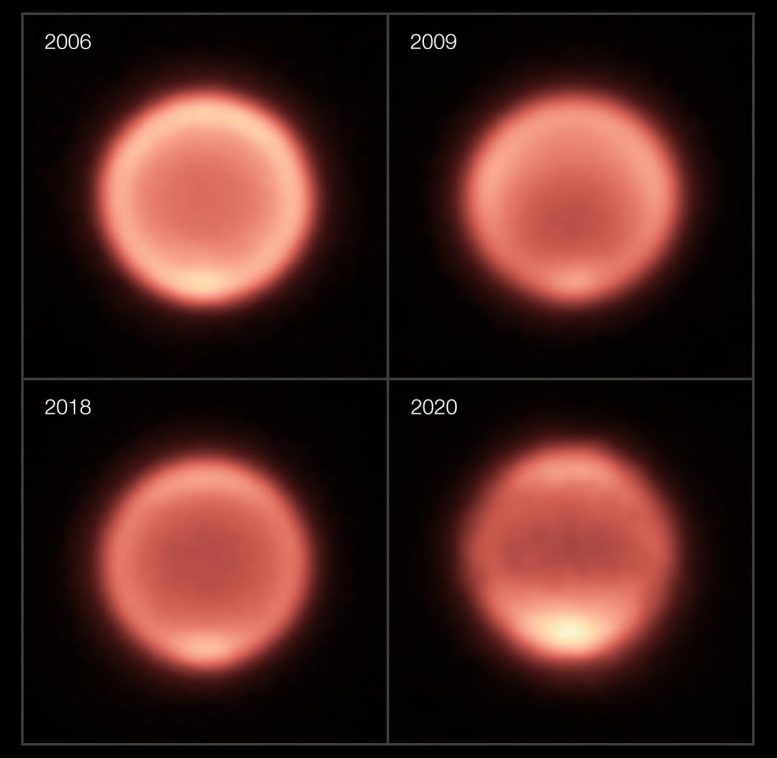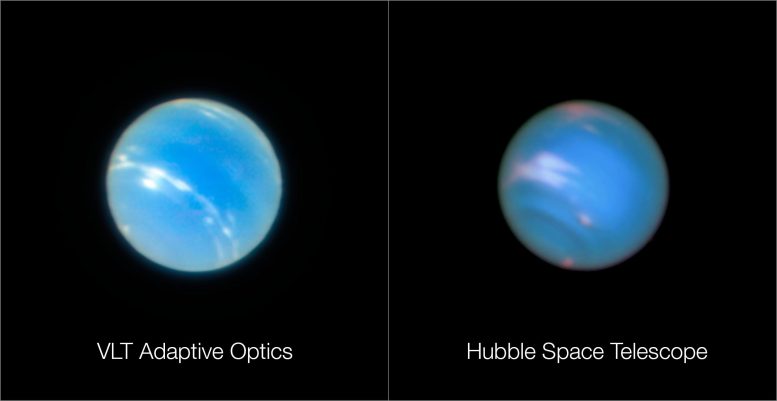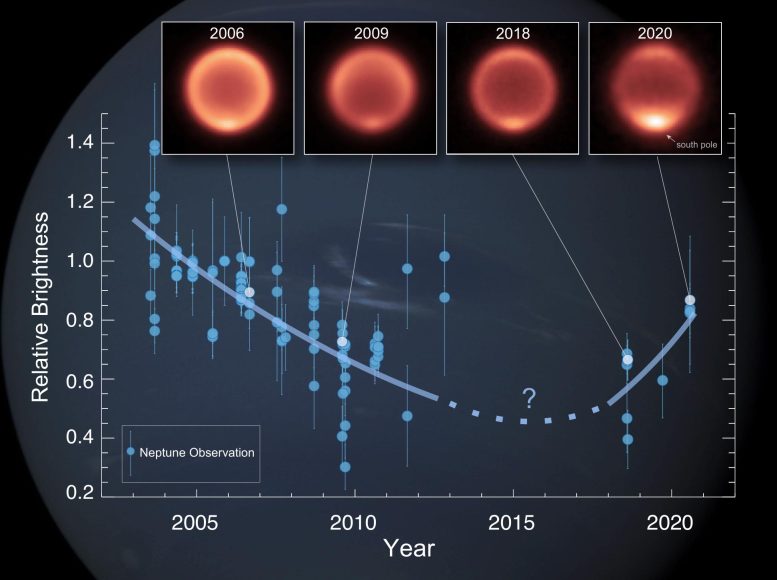Surprising Changes in Neptune’s Temperatures Detected by Astronomers
Scitech Daily ^
| APRIL 19, 2022
| By EUROPEAN SOUTHERN OBSERVATORY (ESO)
Posted on 02/17/2024 5:03:03 PM PST by Red Badger

Over a 17-year period, an international team of astronomers monitored Neptune’s atmospheric temperatures. They discovered that Neptune’s global temperatures dropped unexpectedly, followed by a dramatic warming at its south pole. Credit: ESO/M. Roman
~~~~~~~~~~~~~~~~~~~~~~~~~~~~~~~~~~~~~~~~~~~~~~~~~~~~~~~~~~
Using ground-based telescopes, including the European Southern Observatory’s Very Large Telescope (ESO’s VLT), an international team of astronomers track Neptune’s atmospheric temperatures over a 17-year period. They found a surprising drop in Neptune’s global temperatures followed by a dramatic warming at its south pole.
“This change was unexpected,” says Michael Roman, a postdoctoral research associate at the University of Leicester, UK, and lead author of the study published on April 11, 2022, in The Planetary Science Journal. “Since we have been observing Neptune during its early southern summer, we expected temperatures to be slowly growing warmer, not colder.”
Like Earth, Neptune experiences seasons as it orbits the Sun. However, a Neptune season lasts around 40 years, with one Neptune year lasting 165 Earth years. It has been summertime in Neptune’s southern hemisphere since 2005, and the astronomers were eager to see how temperatures were changing following the southern summer solstice.

This composite shows thermal images of Neptune taken between 2006 and 2020. The first three images (2006, 2009, 2018) were taken with the VISIR instrument on ESO’s Very Large Telescope while the 2020 image was captured by the COMICS instrument on the Subaru Telescope (VISIR wasn’t in operation in mid-late 2020 because of the pandemic). After the planet’s gradual cooling, the south pole appears to have become dramatically warmer in the past few years, as shown by a bright spot at the bottom of Neptune in the images from 2018 and 2020. Credit: ESO/M. Roman, NAOJ/Subaru/COMICS
~~~~~~~~~~~~~~~~~~~~~~~~~~~~~~~~~~~~~~~~~~~~~~~~~~~~~~~~~~~~~~~~~~~~~~~~
Astronomers looked at nearly 100 thermal-infrared images of Neptune, captured over a 17-year period, to piece together overall trends in the planet’s temperature in greater detail than ever before.
These data showed that, despite the onset of southern summer, most of the planet had gradually cooled over the last two decades. The globally averaged temperature of Neptune dropped by 8 °C (14 °F) between 2003 and 2018.
The astronomers were then surprised to discover a dramatic warming of Neptune’s south pole during the last two years of their observations, when temperatures rapidly rose 11 °C (20 °F) between 2018 and 2020. Although Neptune’s warm polar vortex has been known for many years, such rapid polar warming has never been previously observed on the planet.

The image of the planet Neptune on the left was obtained during the testing of the Narrow-Field adaptive optics mode of the MUSE instrument on ESO’s Very Large Telescope. The image on the right is a comparable image from the NASA/ESA Hubble Space Telescope. Note that the two images were not taken at the same time so do not show identical surface features. Credit: ESO/P. Weilbacher (AIP)/NASA, ESA, and M.H. Wong and J. Tollefson (UC Berkeley)
~~~~~~~~~~~~~~~~~~~~~~~~~~~~~~~~~~~~~~~~~~~~~~~~~~~~~~~~~~~~~~~~~~~~~~~~
“Our data cover less than half of a Neptune season, so no one was expecting to see large and rapid changes,” says co-author Glenn Orton, senior research scientist at Caltech’s Jet Propulsion Laboratory (JPL) in the US.
The astronomers measured Neptune’s temperature using thermal cameras that work by measuring the infrared light emitted from astronomical objects. For their analysis, the team combined all existing images of Neptune gathered over the last two decades by ground-based telescopes. They investigated infrared light emitted from a layer of Neptune’s atmosphere called the stratosphere. This allowed the team to build up a picture of Neptune’s temperature and its variations during part of its southern summer.

Observed changes in Neptune’s thermal-infrared brightness, a measure of temperature in Neptune’s atmosphere. The plot shows the relative change in the thermal-infrared brightness from Neptune’s stratosphere with time for all existing images taken by ground-based telescopes. Brighter images are interpreted as warmer. Corresponding thermal-infrared images (top) at wavelengths of ~12 µm show Neptune’s appearance in 2006, 2009, 2018 (observed by the European Southern Observatory’s Very Large Telescope’s VISIR instrument), and 2020 (observed by Subaru’s COMICS instrument). The south pole appears to have become dramatically warmer in just the past few years. Credit: Michael Roman/NASA/JPL/Voyager-ISS/Justin Cowart
~~~~~~~~~~~~~~~~~~~~~~~~~~~~~~~~~~~~~~~~~~~~~~~~~~~~~~~~~~~~~~~~~~~
Because Neptune is roughly 4.5 billion kilometers away and is very cold, the planet’s average temperature reaches around –220 °C (–364 °F), measuring its temperature from Earth is no easy task. “This type of study is only possible with sensitive infrared images from large telescopes like the VLT that can observe Neptune clearly, and these have only been available for the past 20 years or so,” says co-author Leigh Fletcher, a professor at the University of Leicester.
Around one-third of all the images taken came from the VLT Imager and Spectrometer for mid-InfraRed (VISIR) instrument on ESO’s VLT in Chile’s Atacama Desert. Because of the telescope’s mirror size and altitude, it has a very high resolution and data quality, offering the clearest images of Neptune. The team also used data from NASA’s Spitzer Space Telescope and images taken with the Gemini South telescope in Chile, as well as with the Subaru Telescope, the Keck Telescope, and the Gemini North telescope, all in Hawai‘i.
VIDEO AT LINK…………………..
The evolution of thermal images taken from Neptune using the VLT’s VISIR instrument. The images, taken between 2006 and 2021, show Neptune gradually cooling down, before a dramatic heating of its south pole in the last few years. Credit: ESO/M. Roman
Because Neptune’s temperature variations were so unexpected, the astronomers do not know yet what could have caused them. They could be due to changes in Neptune’s stratospheric chemistry, or random weather patterns, or even the solar cycle. More observations will be needed over the coming years to explore the reasons for these fluctuations. Future ground-based telescopes like ESO’s Extremely Large Telescope (ELT) could observe temperature changes like these in greater detail, while the NASA/ESA/CSA James Webb Space Telescope will provide unprecedented new maps of the chemistry and temperature in Neptune’s atmosphere.
“I think Neptune is itself very intriguing to many of us because we still know so little about it,” says Roman. “This all points towards a more complicated picture of Neptune’s atmosphere and how it changes with time.”
For more on this discovery, see Unexpected Atmospheric Temperature Changes Detected on Neptune.
Reference:
“Sub-Seasonal Variation in Neptune’s Mid-Infrared Emission” by Michael T. Roman, Leigh N. Fletcher, Glenn S. Orton, Thomas K. Greathouse, Julianne I. Moses, Naomi Rowe-Gurney, Patrick G. J. Irwin, Arrate Antuñano, James Sinclair, Yasumasa Kasaba, Takuya Fujiyoshi, Imke de Pater and Heidi B. Hammel, 11 April 2022, Planetary Science Journal.
DOI: 10.3847/PSJ/ac5aa4
The team is composed of M. T. Roman and L. N. Fletcher (School of Physics and Astronomy, University of Leicester, UK), G. S. Orton (Jet Propulsion Laboratory/California Institute of Technology, California, USA), T. K. Greathouse (Southwest Research Institute, San Antonio, TX, USA), J. I. Moses (Space Science Institute, Boulder, CO, USA), N. Rowe-Gurney (Department of Physics and Astronomy, Howard University, Washington DC, USA; Astrochemistry Laboratory, NASA/GSFC, Greenbelt, MD, USA; Center for Research and Exploration in Space Science and Technology, NASA/GSFC, Greenbelt, MD, USA), P. G. J. Irwin (University of Oxford Atmospheric, Oceanic, and Planetary Physics, Department of Physics Clarendon Laboratory, Oxford, UK), A. Antuñano (UPV/EHU, Escuela Ingernieria de Bilbao, Spain), J. Sinclair (Jet Propulsion Laboratory/California Institute of Technology, California, USA), Y. Kasaba (Planetary Plasma and Atmospheric Research Center, Graduate School of Science, Tohoku University, Japan), T. Fujiyoshi (Subaru Telescope, National Astronomical Observatory of Japan, HI, USA), I. de Pater (Department of Astronomy, University of California at Berkeley, CA, USA), and H. B. Hammel (Association of Universities for Research in Astronomy, Washington DC, USA).
TOPICS: Astronomy; History; Science; Weather
KEYWORDS: catastrophism; imsorry; neptune; workinauranusjoke
Click here: to donate by Credit Card
Or here: to donate by PayPal
Or by mail to: Free Republic, LLC – PO Box 9771 – Fresno, CA 93794
Thank you very much and God bless you.
Navigation: use the links below to view more comments.
first 1-20, 21-32 next last
1
posted on 02/17/2024 5:03:03 PM PST
by Red Badger
To: MtnClimber; SunkenCiv; mowowie; SuperLuminal; Cottonbay
Ping!………………….
2
posted on 02/17/2024 5:03:32 PM PST
by Red Badger
(Homeless veterans camp in the streets while illegals are put up in 5 Star hotels………………..)
To: Red Badger
Send lawyers, illegals and SUVs quick!
3
posted on 02/17/2024 5:06:04 PM PST
by posterchild
To: Red Badger
Hmm, I wonder if….I mean Neptune is kinda close to Uranus, right?
4
posted on 02/17/2024 5:06:31 PM PST
by Magnum44
(…against all enemies, foreign and domestic… )
To: Red Badger
Climate Change!! Pinging Algore.
5
posted on 02/17/2024 5:06:57 PM PST
by BipolarBob
(One flew East and one flew West . . .)
To: Red Badger
Climate change on Neptune! I though climate change was caused by the life styles of rich white males.
To: Red Badger
Is the same happening thing in my buttocks?
7
posted on 02/17/2024 5:07:23 PM PST
by BobL
(Trump gets my vote, even if I have to write him in; Millions of others will do the same)
To: Red Badger
Blame Aston Martin and their gas-hog “Project Neptune”!

8
posted on 02/17/2024 5:09:12 PM PST
by ProtectOurFreedom
(“Occupy your mind with good thoughts or your enemy will fill them with bad ones.” ~ Thomas More)
To: Red Badger
I am sure some liberal will somehow blame oil and/or humans for this!
To: BobL
This is really more evidence that the science is so bad with regard to what ‘they perceive’ is going on.
Nothing more than error in the past decade or two.
To: Magnum44
Maybe Uranus, but not mine.
11
posted on 02/17/2024 5:11:24 PM PST
by EvilCapitalist
(Pets are no substitute for children)
To: Red Badger
Neptunians Causing Climate Change?
To: Red Badger
Can’t trust this until we get the opinions of marginalized peoples.
13
posted on 02/17/2024 5:13:41 PM PST
by monkeyshine
(live and let live is dead)
To: Red Badger
Oh, Oh, Climate change on Neptune…
Biden, Gore and Kerry need to impose more carbon taxes on America…
14
posted on 02/17/2024 5:13:43 PM PST
by Doc91678
(Doc91678)
To: monkeyshine
Women, children and minorities hardest hit!……………..
15
posted on 02/17/2024 5:15:07 PM PST
by Red Badger
(Homeless veterans camp in the streets while illegals are put up in 5 Star hotels………………..)
To: Red Badger
These wild temperature fluctuations come as no surprise to me. So I renew my call for a complete ban of gasoline vehicles on Neptune.
And of course an entire federal department will have to be created to enforce the ban. For the right salary ($200,000+) I will consent to leading that department.

16
posted on 02/17/2024 5:15:18 PM PST
by Leaning Right
(The steal is real.)
To: Red Badger
Send all the climate change people there so they can fix it by dying like they want us to do here
17
posted on 02/17/2024 5:15:46 PM PST
by Pollard
(Hi)
To: ProtectOurFreedom
18
posted on 02/17/2024 5:21:39 PM PST
by EEGator
To: Magnum44
“Neptune is kinda close “
hmmmm … yes obviously the gases have been heated, silently spreading …. perhaps funds for a gasxpedition are needed
19
posted on 02/17/2024 5:26:58 PM PST
by 1of10
(be vigilant , be strong, be safe, be 1 of 10 .)
To: Red Badger
It has been summertime in Neptune’s southern hemisphere since 2005
Spring breakers there haven’t been back to school for about 20 years, and summer vacations last about 100 years there; ideal for Biden’s vacations.
20
posted on 02/17/2024 5:28:30 PM PST
by adorno
(CCH)
Navigation: use the links below to view more comments.
first 1-20, 21-32 next last
Disclaimer:
Opinions posted on Free Republic are those of the individual
posters and do not necessarily represent the opinion of Free Republic or its
management. All materials posted herein are protected by copyright law and the
exemption for fair use of copyrighted works.
FreeRepublic.com is powered by software copyright 2000-2008 John Robinson


